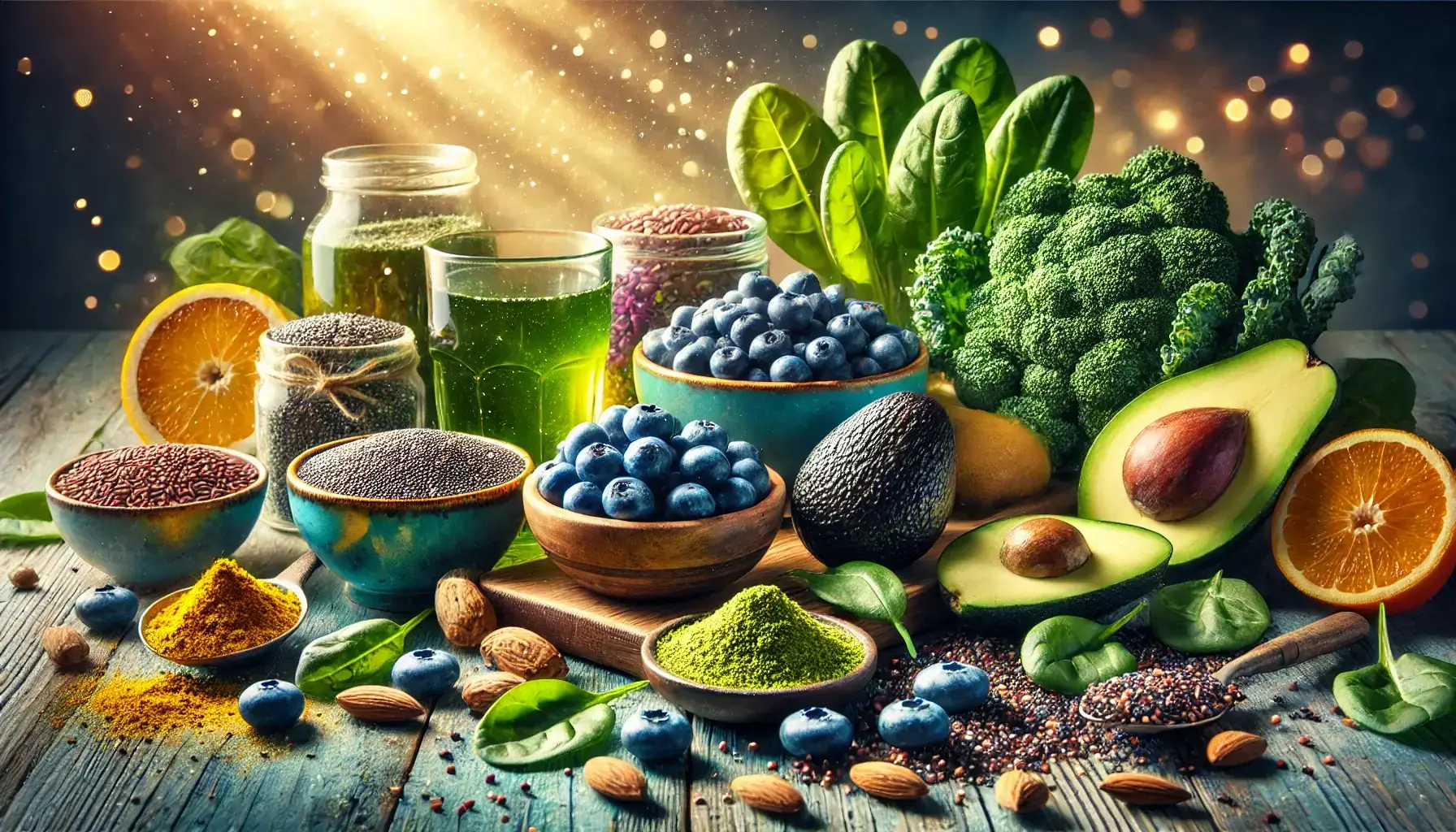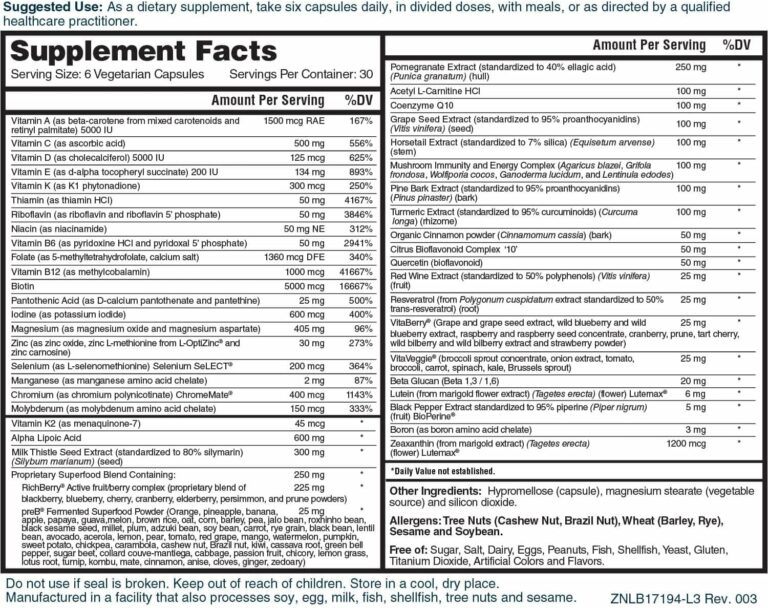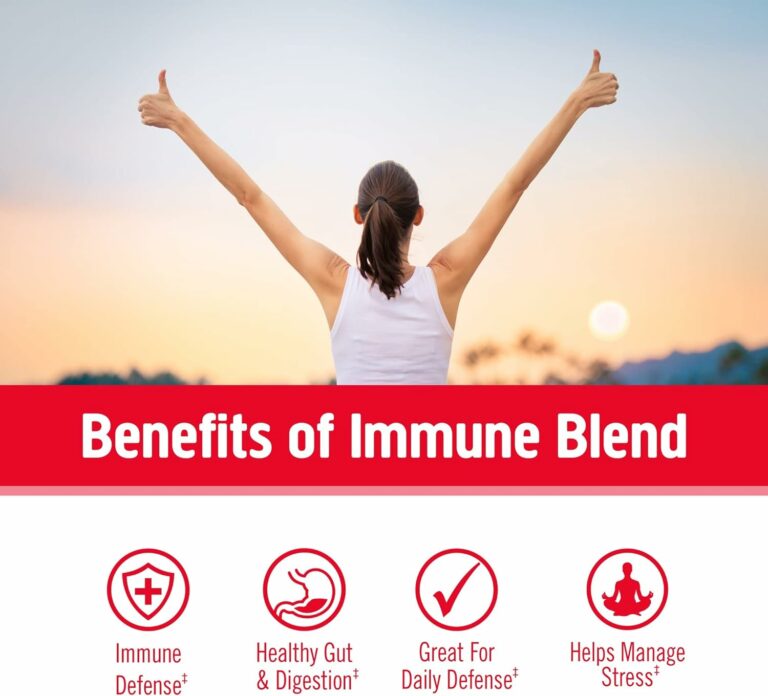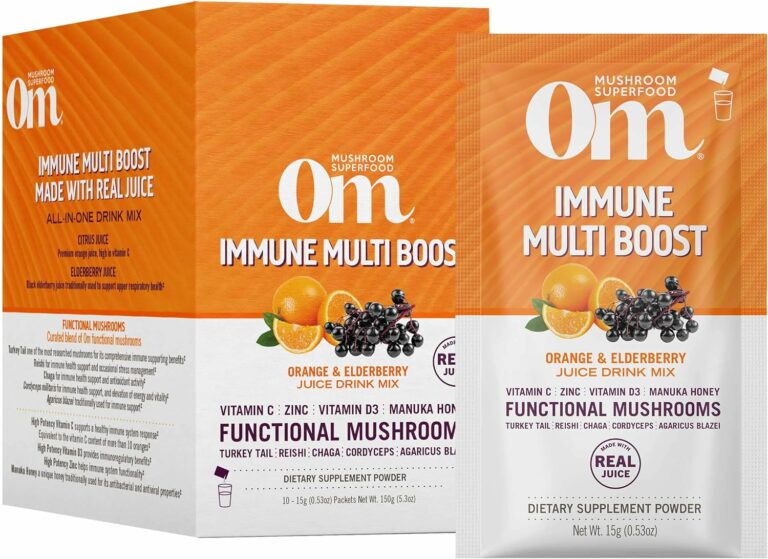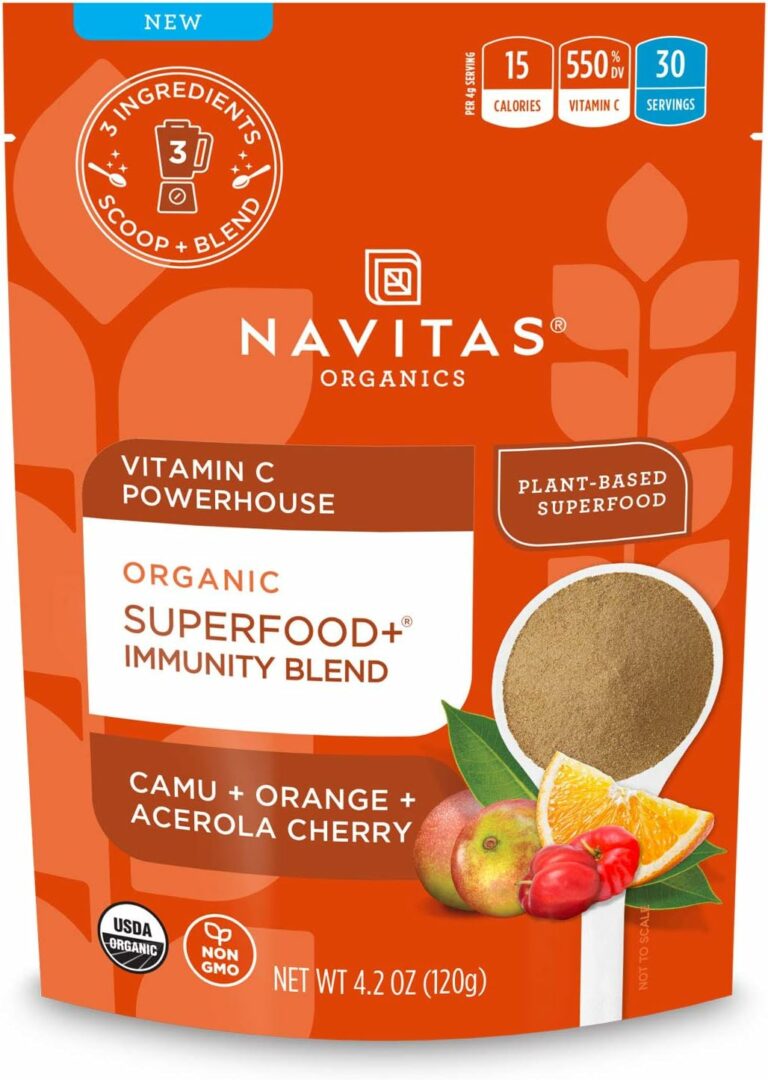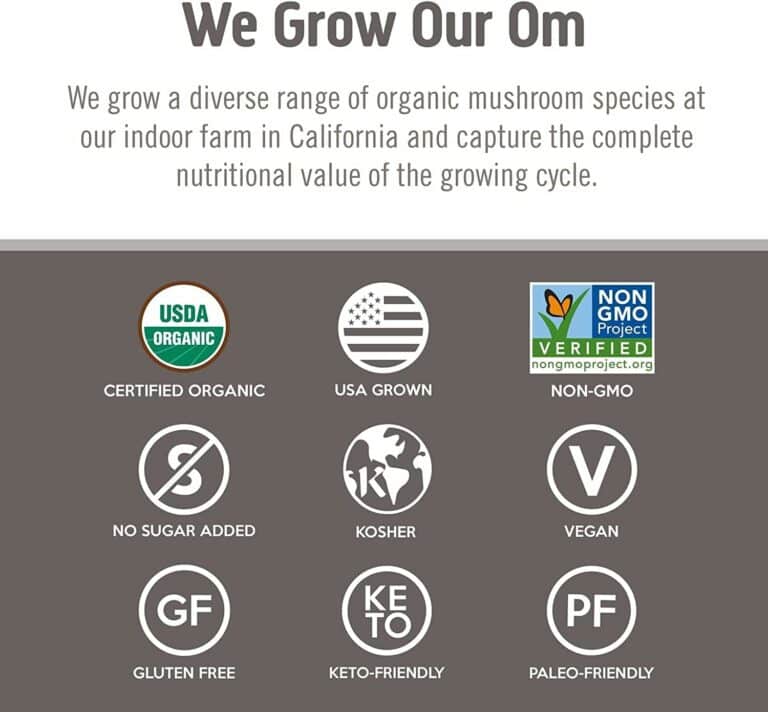Supercharge Your Health with These 10 Must-Eat Superfoods
Are you feeling tired, sluggish, or struggling to maintain your health? You’re not alone. Many people are looking for simple, effective ways to boost their energy and improve their well-being, without drastic lifestyle changes. This is where superfoods come in.
Imagine foods that can naturally enhance your health, help you lose weight, and even strengthen your immune system. These aren’t miracle cures, but nutrient-packed superfoods that can easily fit into your daily meals. By making small, manageable changes—like adding a handful of spinach to your salad or blending blueberries into your smoothie—you can start to feel better and live healthier today.
In this guide, you’ll discover the most powerful superfoods, their incredible health benefits, and easy ways to incorporate them into your life. Whether you’re looking to boost energy, lose weight, or protect yourself from illness, superfoods can be the key to achieving your health goals. Let’s dive in and explore how you can unlock the potential of these nutrient-rich foods.
Takeaway
- Superfoods offer a simple, nutrient-rich way to boost overall health and energy.
- Gradually adding superfoods like spinach or chia seeds can enhance your diet.
- Superfoods help control cravings and support sustainable weight loss.
- Garlic, turmeric, and berries strengthen immunity and reduce inflammation.
- Slowly incorporate superfoods to build long-term healthy habits.
What Are Essential Super Foods?
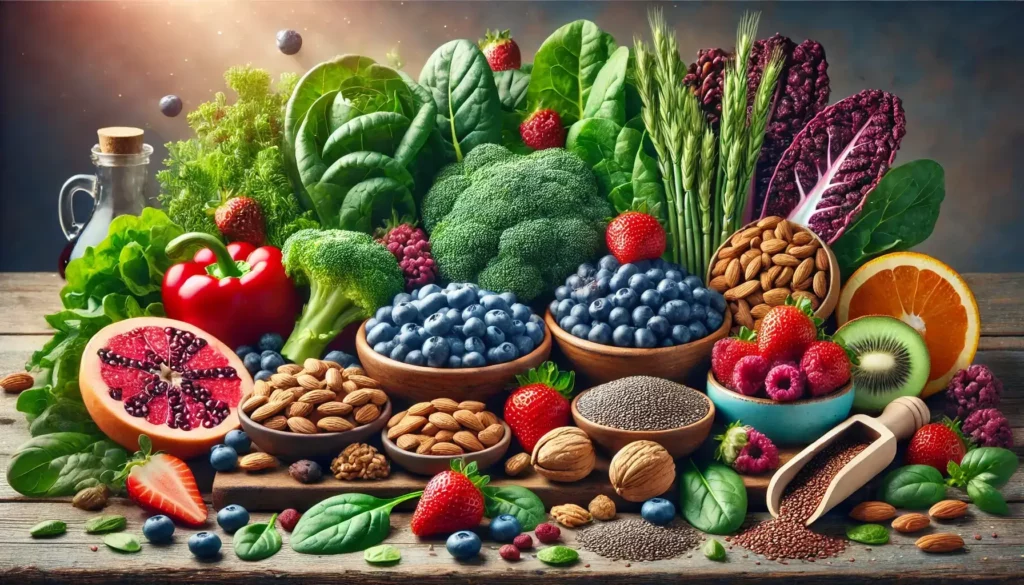
When it comes to living a healthy life, it can feel overwhelming to know what to eat. You’ve probably heard the term “superfoods” tossed around, but what does it really mean? Essential superfoods are simply nutrient-packed foods that give your body what it needs without adding a bunch of extra calories.
These foods are packed with vitamins, minerals, and antioxidants. They help your body fight off illnesses, keep your energy levels high, and support overall wellness. Superfoods are natural, and they come from whole, unprocessed sources like fruits, vegetables, nuts, and seeds.
You might wonder why some foods are called superfoods. It’s because they give you more bang for your buck when it comes to nutrition. Think of them as foods that work harder for your health, offering more benefits per bite compared to other foods.
One key benefit of superfoods is that they can fill nutritional gaps in your diet. If you’re someone who struggles to eat enough fruits and vegetables, adding superfoods can help. They are also great for people who feel tired or sluggish, as these foods naturally boost energy levels without the crash you’d get from sugary snacks or caffeine.
Superfoods are rich in essential vitamins like A, C, and E, which help protect your body from harm. These vitamins act as antioxidants, fighting off free radicals that can damage cells. This helps reduce your risk of developing chronic diseases like heart disease, diabetes, and even cancer.
Many people today deal with stress, fatigue, and a lack of energy. This is where superfoods can come in handy. They provide a natural way to fuel your body and mind, helping you stay focused, energized, and feeling good throughout the day.
Including essential superfoods in your diet doesn’t have to be complicated or expensive. Simple swaps like choosing blueberries over sugary snacks or adding spinach to your meals can make a big difference. These small changes can add up, helping you feel better and stay healthier over time.
You don’t need to overhaul your entire diet overnight. Start by incorporating one or two superfoods into your meals each week. As you get more comfortable, you can gradually add more.
If you’re someone who struggles with cravings, adding superfoods can help control those too. Many superfoods contain fiber, which helps you feel full and satisfied longer. This can reduce overeating and make it easier to stick to a healthy eating plan.
In short, essential superfoods are powerful tools for improving your health. They provide the nutrients your body needs to function at its best. And by making small, simple changes to your diet, you can start feeling better and living healthier today.
Top 10 Essential Super Foods and Their Benefits
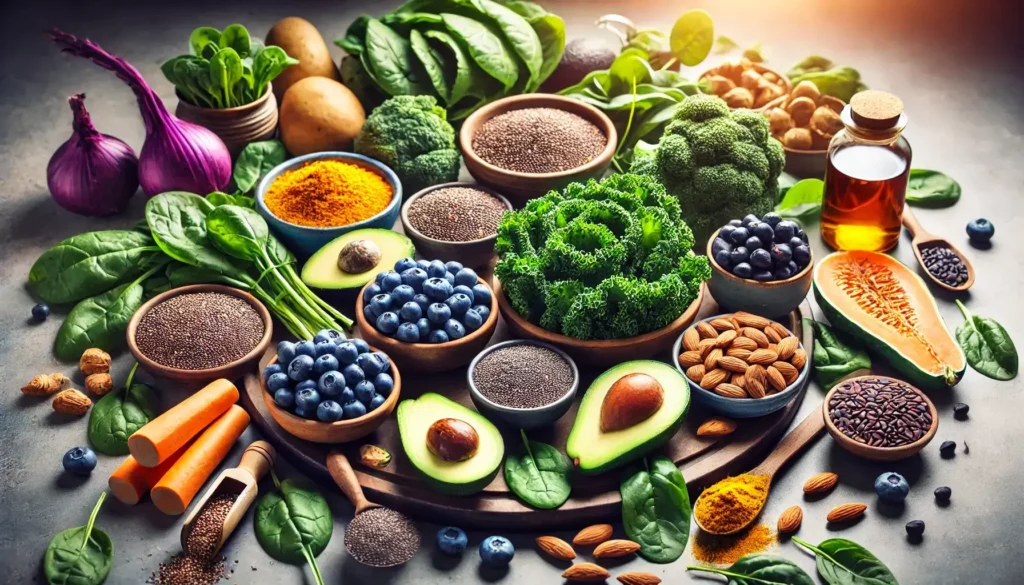
Now that you know what superfoods are, let’s dive into the top 10 essential superfoods that you should consider adding to your diet. Each of these foods is packed with nutrients that can help improve your health in different ways. Whether you’re looking to boost your immune system, increase energy, or just feel healthier overall, these superfoods have got you covered.
- Kale: Kale is one of the most nutrient-dense foods on the planet. It’s loaded with vitamins A, C, and K, which help support your immune system, bone health, and skin. Kale also contains antioxidants that fight inflammation and may reduce the risk of chronic diseases.
- Blueberries: Blueberries are small but mighty when it comes to health benefits. They are high in antioxidants, particularly vitamin C and anthocyanins, which help protect your body from free radical damage. Regularly eating blueberries can also support brain health and improve memory.
- Chia Seeds: These tiny seeds are packed with fiber and omega-3 fatty acids, which are great for your heart and digestive system. Chia seeds are also a good source of protein, making them a fantastic option for plant-based diets. They help keep you full and energized throughout the day.
- Quinoa: Quinoa is a complete protein, which means it contains all nine essential amino acids. This makes it perfect for vegetarians or anyone looking for a nutritious alternative to grains. Quinoa is also high in fiber and rich in magnesium, which supports muscle and nerve function.
- Avocados: Avocados are known for their healthy fats, particularly monounsaturated fats, which are good for your heart. They also provide a good dose of potassium, which helps maintain healthy blood pressure levels. Avocados can also improve your skin health thanks to their vitamin E content.
- Turmeric: Turmeric is a powerful anti-inflammatory spice that’s been used for centuries in traditional medicine. Its active compound, curcumin, helps reduce inflammation and may lower the risk of heart disease and arthritis. Adding turmeric to your meals can also boost your immune system.
- Spinach: Spinach is rich in iron, which is essential for energy and healthy blood. It also contains vitamins A and C, which are great for your skin and immune system. Spinach is easy to add to your meals and can help boost your nutrient intake without adding many calories.
- Almonds: Almonds are a great snack that provides healthy fats, fiber, and protein. They’re also high in vitamin E, which supports skin health and protects your cells from damage. Eating almonds regularly can help lower cholesterol levels and support heart health.
- Sweet Potatoes: Sweet potatoes are rich in beta-carotene, which your body converts into vitamin A. This helps boost your immune system and keeps your skin and eyes healthy. Sweet potatoes are also a great source of fiber and provide slow-burning energy, keeping you full and energized.
- Green Tea: Green tea is loaded with antioxidants that help protect your cells from damage. It’s also known to boost metabolism and aid in weight loss. Drinking green tea regularly can improve brain function and lower your risk of certain diseases, including heart disease.
These 10 superfoods offer a wide range of health benefits, making them a great addition to any diet. Whether you’re looking to boost your energy, improve your skin, or protect your heart, these foods can help you reach your health goals.
Super Foods for Weight Loss
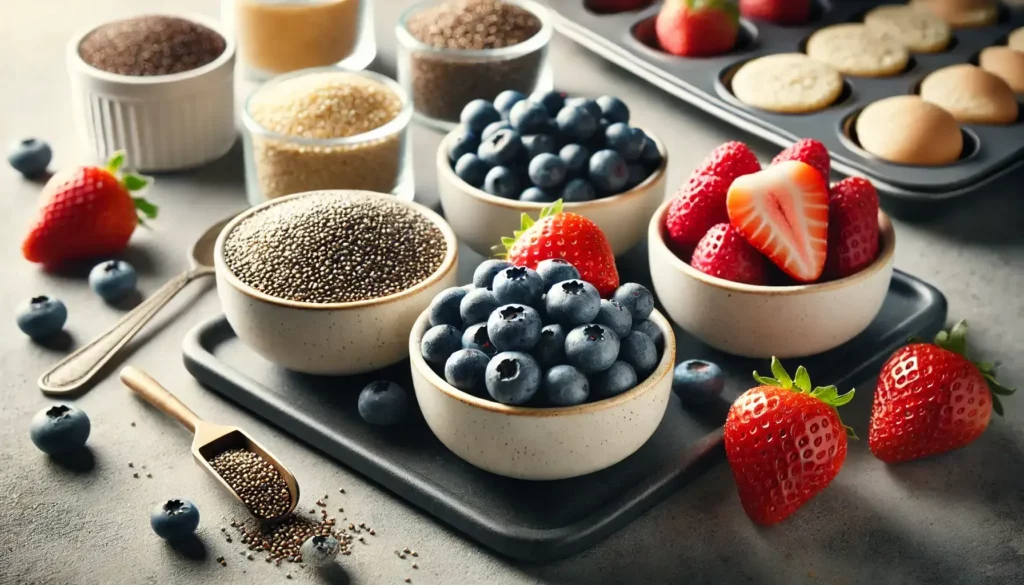
Now that you’ve learned about the top 10 essential superfoods, let’s focus on how some of these foods can help you with weight loss. Many people struggle with finding the right foods to help them lose weight without feeling hungry all the time. The good news is that certain superfoods are not only packed with nutrients, but they can also keep you full and satisfied while supporting your weight loss goals.
When you’re trying to lose weight, the key is to find foods that are low in calories but high in nutrients. Superfoods like chia seeds, quinoa, and sweet potatoes are excellent choices because they provide a lot of fiber. Fiber helps you feel full longer, which means you’re less likely to overeat or snack between meals.
Chia seeds are particularly effective for weight loss because they expand when mixed with liquid, forming a gel-like texture. This helps you feel fuller without eating a large portion. Plus, chia seeds are rich in omega-3 fatty acids, which can help reduce inflammation, another factor that might be slowing down your weight loss efforts.
Quinoa is another great superfood for weight loss because it’s a complete protein. This means it contains all the essential amino acids your body needs, which helps keep your muscles strong while you lose fat. Quinoa is also low in calories and high in fiber, making it a perfect addition to any weight-loss plan.
Sweet potatoes are a fantastic alternative to regular potatoes because they are lower in calories and high in fiber. They also contain slow-digesting carbohydrates, which provide steady energy throughout the day. This means you won’t experience the sugar crashes that come from eating refined carbs, like white bread or pasta.
Adding spinach to your meals is another great way to cut calories while getting the nutrients you need. Spinach is very low in calories but high in vitamins and minerals, making it a perfect food for weight loss. You can add it to salads, smoothies, or even stir it into soups and stews for an extra nutrient boost without adding many calories.
Almonds can also be helpful in weight loss, even though they are higher in calories compared to other superfoods. The healthy fats and protein in almonds help control hunger and cravings. Eating a small handful of almonds as a snack can keep you satisfied and prevent you from reaching for unhealthy junk food.
The great thing about using superfoods for weight loss is that they don’t make you feel deprived. You’re nourishing your body with foods that are packed with vitamins, minerals, and fiber. This means you can eat well, feel satisfied, and still make progress towards your weight-loss goals.
It’s also important to remember that weight loss is not just about cutting calories—it’s about eating foods that give your body the nutrients it needs to function at its best. By incorporating superfoods into your diet, you’re giving your body the fuel it needs to burn fat and stay energized.
Incorporating superfoods into your meals is a simple and effective way to support your weight loss efforts. You don’t need to make drastic changes to your diet—start by adding a few of these foods to your weekly meal plan. Over time, you’ll notice the difference they make in how you feel and how easy it becomes to maintain a healthy weight.
Immune-Boosting Super Foods
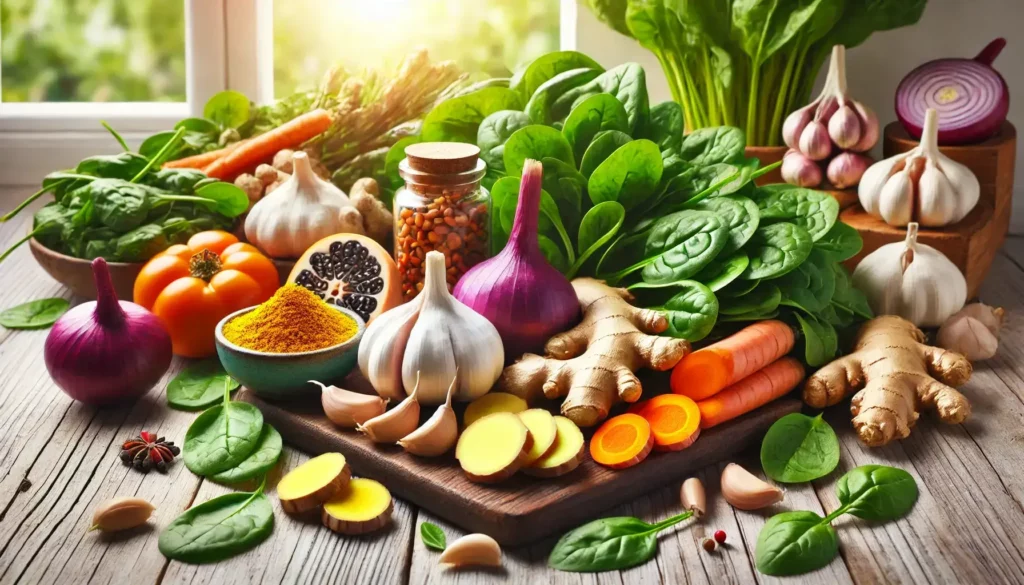
As you focus on improving your health and even supporting weight loss, it’s important to keep your immune system strong. A healthy immune system helps protect your body from illnesses and infections. Luckily, many superfoods are not only great for weight loss but can also boost your immune system, helping you stay healthy and energized.
When it comes to boosting your immune system, superfoods are your best friends. They are packed with vitamins, minerals, and antioxidants that your body needs to fight off harmful germs and viruses. Some of these superfoods can even help reduce inflammation, which is key to keeping your immune system working properly.
Garlic is one of the top immune-boosting superfoods. It contains a compound called allicin, which has been shown to have antiviral and antibacterial properties. Including garlic in your meals can help protect you from getting sick, and it also adds great flavor to many dishes.
Another powerful superfood for your immune system is turmeric. Turmeric is known for its anti-inflammatory effects, thanks to its active compound, curcumin. By reducing inflammation in your body, turmeric helps your immune system stay strong and focused on fighting off infections. You can easily add turmeric to your meals, or enjoy it as a warm turmeric tea.
Ginger is another immune-boosting superfood you’ll want to include in your diet. Ginger has been used for centuries to help treat colds and flu due to its antiviral and antibacterial properties. It’s also great for reducing inflammation and soothing digestive issues, making it a fantastic all-around superfood.
If you’re looking for a leafy green that supports your immune health, spinach is an excellent choice. Spinach is rich in vitamin C, which is known to boost immune function. It’s also packed with antioxidants that help your body fight off harmful free radicals.
Berries, like blueberries and strawberries, are also great for supporting your immune system. They are loaded with vitamin C and other antioxidants that strengthen your body’s natural defenses. Eating a handful of berries each day can give your immune system the extra boost it needs to stay healthy.
Another superfood to consider is almonds. Almonds are high in vitamin E, which is important for maintaining a strong immune system. Vitamin E acts as an antioxidant, helping to protect your cells from damage. Just a small handful of almonds as a snack can make a big difference in your overall health.
Citrus fruits, such as oranges, grapefruits, and lemons, are well known for their immune-boosting benefits. They are rich in vitamin C, which helps your body produce more white blood cells, the key to fighting infections. Adding citrus to your diet is an easy way to strengthen your immune system, especially during cold and flu season.
Including these immune-boosting superfoods in your diet is a simple and effective way to protect your body from getting sick. By giving your body the nutrients it needs, you’ll feel more energized, focused, and ready to take on each day. The best part is that these superfoods are easy to incorporate into your meals, whether you’re cooking at home or grabbing a quick snack.
Incorporating immune-boosting superfoods into your daily routine doesn’t have to be complicated. Simple changes, like adding garlic and turmeric to your meals, or snacking on almonds and berries, can make a big difference. By taking small steps, you’re helping your body stay strong and healthy, no matter what life throws your way.
How to Easily Incorporate Super Foods into Your Diet
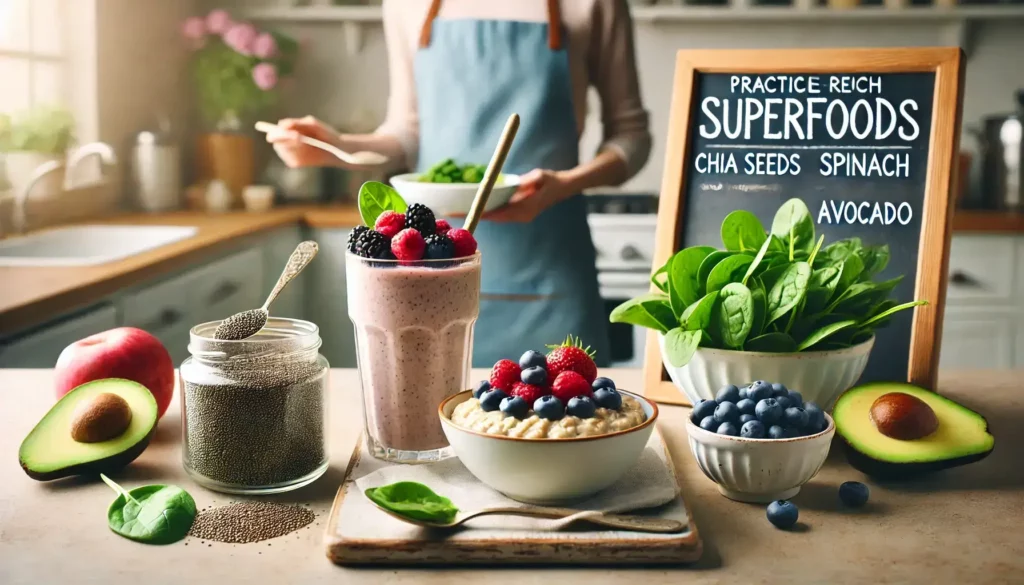
Now that you know how superfoods can help with weight loss and boost your immune system, the next step is figuring out how to include them in your everyday meals. It might seem challenging at first, especially if you’re not used to eating these foods regularly. But with a few simple tips, you’ll find that adding superfoods to your diet can be both easy and enjoyable.
One of the easiest ways to get more superfoods into your diet is by starting with your breakfast. Breakfast is an important meal, and it’s the perfect time to pack in some nutrient-rich superfoods. You can start by adding chia seeds or blueberries to your morning oatmeal or yogurt. This simple step will give you a boost of fiber, antioxidants, and healthy fats to start your day off right.
Smoothies are another great way to incorporate superfoods without much effort. You can blend in spinach, kale, or even avocado for a creamy texture. Adding a handful of berries or a spoonful of chia seeds will also up the nutrient content of your smoothie. The great thing about smoothies is that you can mix and match superfoods based on what you like and what your body needs.
For lunch, consider making a salad packed with superfoods. You can use spinach or kale as your base and add in other superfoods like avocados, almonds, and quinoa. If you’re someone who struggles with feeling full after a meal, these foods will help because they’re packed with fiber and healthy fats. This means you’ll feel satisfied longer without needing to snack as often.
You can also incorporate superfoods into your snacks. For example, almonds are an easy, portable snack that’s rich in protein and healthy fats. If you want something sweet, try making energy balls with chia seeds, almonds, and a little honey. These snacks are not only healthy but also delicious, making it easier to stick to your health goals.
Dinner is another opportunity to include more superfoods. You can add garlic and turmeric to your meals for both flavor and health benefits. For example, you can roast vegetables like sweet potatoes and carrots with a sprinkle of turmeric and garlic. This not only makes your meal taste great but also boosts its nutritional value, especially for your immune system.
One of the best things about superfoods is that they’re versatile and can fit into almost any meal. If you’re cooking at home, it’s easy to experiment by adding a few superfoods to your recipes. If you’re eating out, look for menu items that include superfoods like avocados, spinach, or quinoa.
For many people, the hardest part of eating healthier is making it a habit. The key to success is starting small and gradually increasing the amount of superfoods in your diet. You don’t need to change everything overnight. Instead, try adding one or two superfoods to your meals each week. Over time, these small changes will add up and become part of your routine.
If you’re someone who’s busy and doesn’t have time to cook every meal from scratch, you can still incorporate superfoods into your diet. Look for pre-packaged snacks or meals that include superfoods, such as chia seed bars or quinoa salads. While fresh is always best, these convenient options can help you stay on track when you’re pressed for time.
Incorporating superfoods into your diet doesn’t have to be complicated or overwhelming. By making small, manageable changes, you can boost your health and feel better without drastically changing your lifestyle. With a little planning and creativity, you’ll find that eating superfoods can be easy, delicious, and incredibly rewarding.
Conclusion
Now that you’ve learned how to easily incorporate superfoods into your daily meals, it’s clear that these nutrient-rich foods can play a key role in supporting your health. Whether you’re looking to boost your energy, lose weight, or strengthen your immune system, superfoods offer a simple and effective way to achieve your goals. But remember, you don’t need to make drastic changes to your diet overnight.
One of the best ways to make lasting changes is to start small. Maybe you add a handful of spinach to your salad, or sprinkle chia seeds on your breakfast. These small adjustments can have a big impact on your overall well-being without feeling overwhelming. By gradually including more superfoods in your meals, you’ll start to notice positive changes in your energy levels, mood, and overall health.
It’s also important to stay flexible and listen to your body. Not every superfood will work for everyone. For example, some people might feel more energized after eating quinoa, while others might prefer the quick, sustained energy from sweet potatoes. It’s okay to experiment and find what works best for you.
Superfoods are not a magic solution, and it’s important to recognize that overall balance is key. You should aim to eat a wide variety of foods to ensure your body gets all the nutrients it needs. Superfoods are a great addition to an already balanced diet, but they work best when paired with other healthy habits like regular exercise and staying hydrated.
I’m confident that the superfoods mentioned in this guide, such as garlic, turmeric, blueberries, and kale, are backed by solid research and widely known for their health benefits. However, if you’re ever unsure about how certain foods affect your body or if you have any health conditions, it’s always a good idea to consult with a healthcare professional.
As you continue on your journey to better health, remember that small, consistent changes are often the most effective. By adding superfoods to your diet, you’re making a powerful investment in your future health. So take it one step at a time, and before long, you’ll have a routine that supports both your physical and mental well-being.
Incorporating these foods doesn’t have to be difficult or expensive. With a little planning and some creativity, you’ll find that superfoods can easily become a part of your everyday life. Whether you’re blending up a quick smoothie, tossing a salad, or enjoying a nutrient-packed snack, superfoods can make a big difference in how you feel day-to-day.
Final Thoughts and Call to Action
As we wrap up, it’s important to remember that the benefits of adding superfoods to your diet go beyond just boosting your health in the short term. By incorporating nutrient-rich foods like chia seeds, spinach, and turmeric into your daily meals, you’re giving your body the fuel it needs to function at its best. Over time, these small changes can lead to long-lasting improvements in your energy levels, immune system, and overall well-being.
If you’re feeling unsure about where to start, don’t worry. You don’t need to overhaul your entire diet at once. Begin by introducing one or two superfoods into your weekly routine, and gradually build from there. For example, you could try adding blueberries to your breakfast or tossing some kale into your lunch salad. Small, consistent steps like these can make a big difference without feeling overwhelming.
I’d also like to mention that not all superfoods work the same for everyone. While quinoa might give some people a boost in energy, others might find that sweet potatoes work better for them. There’s no one-size-fits-all approach, so it’s okay to experiment and see which superfoods make you feel your best. If you’re ever in doubt about a specific food or how it affects your body, consulting a healthcare professional can give you peace of mind.
To get the most out of superfoods, it’s important to pair them with a balanced diet. While superfoods are powerful, they work best when combined with other healthy eating habits. Think of them as an addition to an already nutritious diet rather than a magic solution. Eating a variety of foods will ensure your body gets the full range of nutrients it needs.
Now that you know how to incorporate superfoods into your diet and why they’re beneficial, it’s time to take action. Start by choosing one or two superfoods to try this week. You could experiment with a new recipe or simply add a small portion to your regular meals. Over time, these small changes will add up and contribute to your overall health and well-being.
I also encourage you to share your favorite superfoods or recipes with others. Not only will this help you stay motivated, but it can also inspire others to make healthy changes. You never know how your experience could help someone else improve their health too.
So, what’s your favorite superfood? Or, if you haven’t tried one yet, which one are you most excited to include in your meals? Share your thoughts or try one of the recipes suggested here, and let’s start this journey to better health together!
FAQs About Essential Super Foods
1. Can superfoods really help prevent diseases like cancer? Superfoods contain antioxidants, vitamins, and other compounds that may reduce the risk of certain diseases by protecting your cells from damage. For example, berries, like blueberries, are rich in antioxidants, which help neutralize harmful free radicals in the body. However, it’s important to note that no single food can prevent or cure diseases like cancer on its own. A balanced diet with a variety of fruits, vegetables, and whole grains is the most effective way to support overall health. Dr. Axe, Nebraska Medicine.
2. Are superfoods expensive? Some superfoods can be more expensive than regular foods, especially if they’re exotic or difficult to find. However, many superfoods like spinach, oats, and sweet potatoes are affordable and widely available. You don’t need to buy expensive powders or supplements—just focus on whole, fresh foods that fit your budget. Real Simple, Nebraska Medicine.
3. How can I tell if a food is really a “superfood”? The term “superfood” is more of a marketing label than a scientific one, and it typically refers to foods that are packed with nutrients like vitamins, minerals, and antioxidants. Some common examples include leafy greens, nuts, seeds, and berries. If a food is nutrient-dense and provides a lot of health benefits without too many calories, it’s likely considered a superfood. Nebraska Medicine.
4. Can I get the same benefits from superfood powders as from whole foods? While superfood powders can be a convenient way to boost your nutrient intake, whole foods are usually the better option because they contain fiber and other important components that are lost during processing. Fresh foods like kale, berries, and avocados not only offer more complete nutrition but also help you feel fuller for longer. Dr. Axe, Real Simple.
5. Do superfoods help with digestion? Yes, many superfoods support digestive health. For instance, chia seeds and oats are high in fiber, which aids digestion by promoting regular bowel movements. Additionally, fermented superfoods like yogurt and kimchi are rich in probiotics, which help balance the gut microbiome and improve overall digestive health. Real Simple, Nebraska Medicine.

